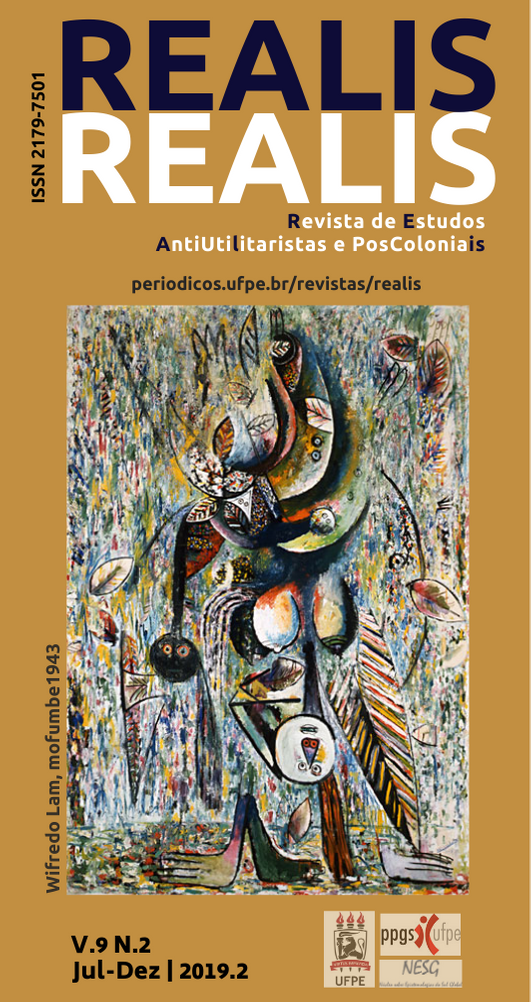Rethoric construction of a threat: the iranian case
DOI:
https://doi.org/10.51359/2179-7501.2019.242939Keywords:
post-colonial theory, Iran, United States, threat buildingAbstract
This paper seeks to develop the rhetorical construction that leads Iran to transform itself from a Western ally “ally” country to an international threat. It seeks to highlight how hostilities that existed only between Iran and the United States were produced as a "threat" to the entire "international community." To the extent that the United States plays a leading role in this, a country perceived as dangerous to the United States poses a "public threat." The article guides its argument among theorists who denaturalize this construction of values as reliable and question, through the Post Colonial Theory, made possible mainly by the advent of colonialism, how it persists being able to embrace the cultural domination of marginalized peoples.
References
ADICHIE, Chimamanda Ngozi. (2013). Vídeo disponível em: http://www.youtube.com/watch?v=ZUtLR1ZWtEY. Acesso em: 10/10/2013.
AYOOB, Mohammed. (1997). Defining Security: a subaltern realist perspective. In Critical Security Studies, edited by Keith Krause and Michael C. Williams. Minneapolis, MN: University of Minnesota Press.
AYOOB, Mohammed. (2004). Political Islam: Image and Reality. World Policy Journal, 2004
BUZAN, Barry. WAEVER, Ole; DE WILDE, Jaap. (1998). Security: a new framework for analysis. Londres: Lynne Rienner Publishers.
BUZAN, Barry; WAEVER, Ole. (2003). Regions and Powers – the structure of International Security. Cambridge University Press. pp.185-218.
BYRNE, Malcolm; GASIOROWSKI, Mark J. (2004). Mohammad Mossaddeq and the 1953 Coup in Iran. Syracuse University Press.
CAMPBELL, David. Violent performances: Identity, Sovereignty, Responsibility. The Return of Culture and Identity in IR Theory. Boulder: Lynne Rienner Publishers. Lapid, Yosef and Kratochwil, Friedrich. Boulder: Lynne Rienner Publishers, 1996.
DARBY, Phillip and PAOLINY, A.J. (1994). Bridging International Relations and Postcolonialism., 371-397.
DE DECCA, Edgar Salvadori. E. P. (1995). Thompson: um personagem dissidente e libertário. Projeto História. Revista do Programa de Estudos Pós-Graduados em História e do Departamento de história da PUC/SP, n. 12, out.
DOTY, Roxanne L. (2003). Foreign policy as social construction: a post-positivist analysis of U.S. counter-insurgency policy in the Philippines. International Studies. Quarterly, v. 37, n. 3, Bloomington, pp. 297-320. Arizona State University.
GORDON, Matthew. (1987). Os grandes líderes: Khomeini. São Paulo: Editora Nova Cultural.
GRIFFITHS, Martin. (2007). International Relations Theory for the 21st Century. Routledge, London and New York.
FOUCAULT, Michael. (1986). A Arqueologia do Saber. Rio de Janeiro: Forense Universitária.
FOUCAULT, Michael. (1992). As Palavras e as Coisas. São Paulo: Martins Fontes.
FOUCAULT, Michael. (1987). Vigiar e punir. Nascimento da prisão. Petrópolis: Vozes.
HALLIDAY, Fred. (1981). Iran: Dictadura y Desarrolo. México D.F: Fondo de Cultura Económica.
HANSEN, Lene. (2006). Security as Practice: Discourse Analysis and the Bosnian War. New York.
JABRI, Vivienne. (2007). Michel Foucault’s Analytics of War: The Social, the International, and the Racial. In International Political Sociology, vol. 1, nº 1,pp. 67-81.
JERVIS, Robert. (1978). Cooperation under security dilemma. World Politics, vol.30, n.2,. pp.167-214
KEENE, Edward. (2002). Beyond the Anarchical Society: Grotius, Colonialism and Order in World Politics. Nova Iorque: Cambridge University Press.
KEEGAN, John. (1995). Uma História da Guerra. São Paulo: Companhia das Letras.
MILLIKEN, Jennifer. (1999). The Study of Discourse in International Relations: A Critique of Research and Methods. In European Journal of International Relations.
LEWIS, Bernard. (1996). O Oriente Médio: do advento do cristianismo aos dias de hoje. São Paulo: Jorge Zahar Editor.
LEWIS, Bernard. (2003). I’m right, you’re wrong, go to hell. Religions and the meeting of civilization. Atlantic Monthly.
LEWIS, Bernard. (2002). O que deu errado no Oriente Médio? Rio de Janeiro: Jorge Zahar Editor.
LIMBERT, John W. (2009). Negotiating with Iran: Wresting the Ghosts of History. Washington, D.C: United States Institute of Peace Press.
McLEOD, John. (2010). Beginning Postcolonialism.New York: Manchester University Press, 2010.
MEIHY, Murilo Sebe Bon. (2007). Por Devoção à República: Nação e Revolução no Irã entre 1979 e 1988. Dissertação de mestrado pela PUC-Rio.
MESSARI, Nizar. (2003). Existe um novo cenário de segurança internacional? In: GOMES, José Maria (org.). América Latina y el (des)orden neoliberal – hegemonia, contrahegemonia, perspectivas. Buenos Aires: CLACSO, 1ª ed. pp.131-150.
NOGUEIRA, João Pontes & MESSARI, NIZAR. (2005). Teoria das Relações Internacionais: correntes e debates. Editora Campus.
PAHLAVI, Mohamed Reza. (1967). The White Revolution of Iran. s/l, The Imperial Pahlavi Library.
PINTO, Paulo. G. H. D. R. (2005). Ritual, etnicidade e identidade religiosa nas comunidades muçulmanas no Brasil. Revista USP, São Paulo, p. 228-250, setembro/novembro. ISSN 67.
RACHLIN, Nahid. (2007). Garotas da Pérsia. Rio de Janeiro: Rocco.
SAID, Edward W. (2007). Orientalismo. São Paulo: Companhia das Letras.
SAID, Edward W. (2006). Cultura e Resistência. Rio de Janeiro: Ediouro Publicações.
SAID, Edward W. (1995). Cultura e Imperialismo. São Paulo: Companhia das Letras.
SALAMA, Mohammad R. (2011). Islam: Orientalism and Intellectual History. London – New York: I. B. Tauris.
SCHMITTCHEN, Dirk; STRITZEL, Holger. (2011). Securitization culture and power: rogue states in US and German discourse. In Thierry Balzacq ‘Securitization Theory’. London: Routledge.
U.S Department of Defense. (2013). Acesso em 13 de abril. http://www.defense.gov/transcripts/transcript.aspx?transcriptid=4295.
US Department of State. (2013).. Disponível em: http://www.state.gov/ Acesso em: 19 de maio.
WEIL, Josef, org. (2007). O Oriente Médio na perspectiva marxista. São Paulo: Editora Sundermann, 2007.
Downloads
Published
Issue
Section
License
A revista se reserva o direito de efetuar, nos originais, alterações de ordem normativa, ortográfica e gramatical, com o intuito de manter o padrão culto da língua, respeitando, porém, o estilo dos autores;
As opiniões emitidas pelos autores são de sua exclusiva responsabilidade
Os direitos autores para artigos publicadoss nesta são dos autores, com direitos de primeira publicação para a REALIS. Todos o contéudo da revista, com exceção de caos especificamente declarados, é licenciado sob licença Creative Commons CC Atribuição Não Comercial 4.0 Internacional. Devido à política de acesso aberto da Revista, todos os artigos são gratuitos e livres para uso, com atribuição apropriada, para fins educacionais e não-comerciais.


